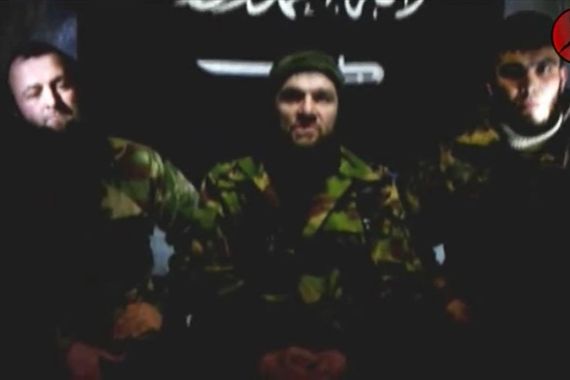Chechen claims Russia bomb attack
Separatist leader Doku Umarov says he ordered suicide bombing that killed 36 at Moscow’s busiest airport last month.

| Neave Barker reports on the Chechen separatist’s claim of responsibility for the Domodedovo airport suicide bombing |
Doku Umarov, the Chechen separatist leader, has claimed responsibility for last month’s bombing at Moscow’s main airport that killed 36 people, after an earlier warning to make 2011 a year of “blood and tears”.
“This operation was carried out on my order,” he said in a video posted on Monday on the Kavkaz Centre website, referring to the January 24 suicide attack at Domodedovo airport.
Umarov, 46, described the attack as a “special operation” directed against the Russian people and Vladimir Putin, the Russian prime minister.
He said there would be further attacks in pursuit of an independent Muslim state in Russia’s Caucasus region, an area embracing Chechnya, Dagestan, Ingushetia and other nearby territories.
He said it was also to avenge Russian “crimes” in the region and underlined that the blast was purposely staged at the international arrivals hall as the aim was to kill foreigners.
Umarov, one of Russia’s most wanted men, and the self-proclaimed Emir of the “Caucasus Emirate”, appeared in the video, reportedly made on the day of the attack, wearing combat fatigues.
‘War’ threats
Umarov, who has promised Russians that “the war will come to your streets”, also claimed to have ordered the suicide bombing that killed more than 40 people in the Moscow subway in March, and the bombing of a luxury train, the Nevsky Express, which killed 28 in November 2009.
| IN DEPTH | |||||||
|
Rights activists have long criticised tactics in raids against separatists in the North Caucasus – known by the authorities as special operations – for being overly brutal and targeting civilians as well as suspects.
The Kremlin has repeatedly said giving up the Caucasus and negotiating with so-called “terrorists” was not an option.
Tuesday’s statement came as a policeman was shot dead in Nalchik, the capital of Kabardino-Balkaria, a region within the North Caucasus.
Attacks on officials and police are a daily occurrence in the North Caucasus and after a lull of several years, suicide attacks returned to Moscow in March last year when two female suicide bombers from the region killed 40 and wounded dozens on the underground during morning rush hour.
After the March attacks Umarov said they were revenge for the deaths of innocent civilians in a Russian special operation. In a similar video at the time, Umarov said the bombings would go on as long as the “crimes committed by the gangs under Putin continued”.
The Kremlin fought two wars against separatist rebels in Chechnya in the 1990s but the uprising has now spread to neighbouring regions such as Ingushetia and Dagestan.
